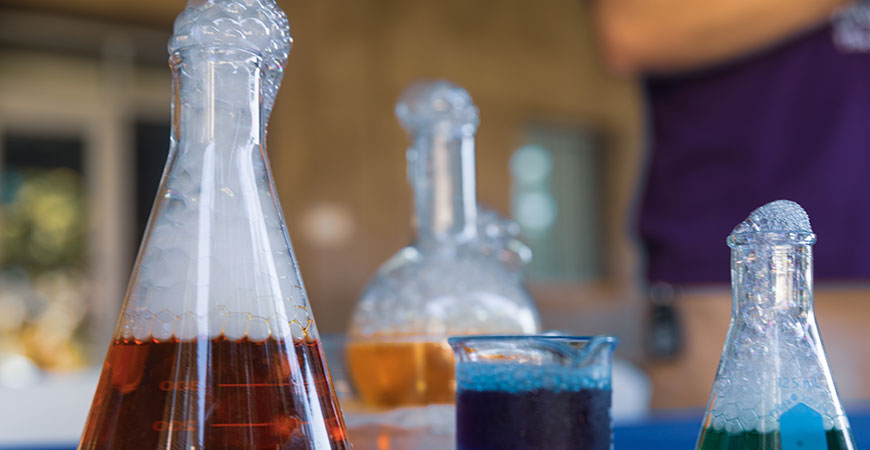
Five faculty members from the School of Natural Sciences received grants recently from the Department of Energy (DOE) under its Funding for Accelerated, Inclusive Research (FAIR) initiative.
To support research at minority-serving institutions and emerging research institutions, the DOE announced $37 million in grants for 52 projects at 44 colleges and universities nationwide. The aim is to build research capacity, infrastructure and expertise at institutions that are historically underrepresented in the DOE's Office of Science portfolio.
Each of the UC Merced researchers will receive more than $500,000 in FAIR funds for up to three years because of the merit of their proposals and because UC Merced is a designated Hispanic Serving Institution.
The five professors and their projects are:
- Changho Kim (Applied Mathematics): “Machine-Learning-Based Surrogate Modeling for Stochastic Multiscale Simulation Methodology”
- Michael Thompson (Chemistry and Biochemistry): “Developing Temperature-jump X-ray Crystallography to Study Dynamic Biosynthetic Enzymes at Synchrotrons and XFELs”
- Aurora Pribram-Jones (Chemistry and Biochemistry): “Localized electrons, ionization potentials, and non-thermal states in warm dense matter from the thermal projection-based initial maximum overlap method”
- Tao Ye (Chemistry and Biochemistry): “Super-resolution 3D Atomic Force Microscopy of Electrochemical Interfaces”
- Liang Shi (Chemistry and Biochemistry): “Advancing Atomistic Understanding of Electronic Energy Transfer”
The grants are intended to foster mutually beneficial relationships between the universities and partnering institutions, such as national labs, to perform basic research in applied math, biology, chemistry, computer science, engineering, geoscience, isotopes, material science and physics.
For example, Thompson will further a partnership he has with the Stanford Linear Accelerator Center (SLAC), a national particle-accelerator laboratory for research in high-energy particle physics and synchrotron-radiation physics.
He and his lab designed a new experimental technique and, starting with SLAC, want to distribute it so other researchers can use it.
“We are studying the structures and motions of biological molecules such as proteins, and traditionally it has been relatively hard to study them while they are in motion,” he said. “We have developed what is, essentially, a high-speed camera for capturing the motions.”
Ye’s lab is working with engineering Professor Ashlie Martini and Lawrence Berkeley Nationals Laboratory’s Molecular Foundry.
“We are developing a microscopy technique that allows us to image water or other solvent molecules at the interfaces between electrolyte solutions and electrode materials,” he said. “For the moment, we know very little about the structure of these interfaces, where electrochemical energy conversion of batteries, fuel cells and supercapacitors takes place.”
The grants are intended to expand the talent pool that will further the DOE’s missions, transform people’s understanding of nature and catalyze scientific discoveries that can lead to technical breakthroughs.
“Ensuring America’s best and brightest students have pathways to STEM fields will be key to achieving President Joe Biden’s energy and climate goals, including achieving a net-zero carbon economy by 2050,” the DOE said in a statement.
“To reach our scientific goals, we need all voices represented at the table, including those who have been historically excluded from critical scientific conversations,” U.S. Secretary of Energy Jennifer M Granholm said. “This funding will help academic institutions expand their research portfolios and spur future scientific discovery, creating a top-notch workforce to advance American competitiveness.”






